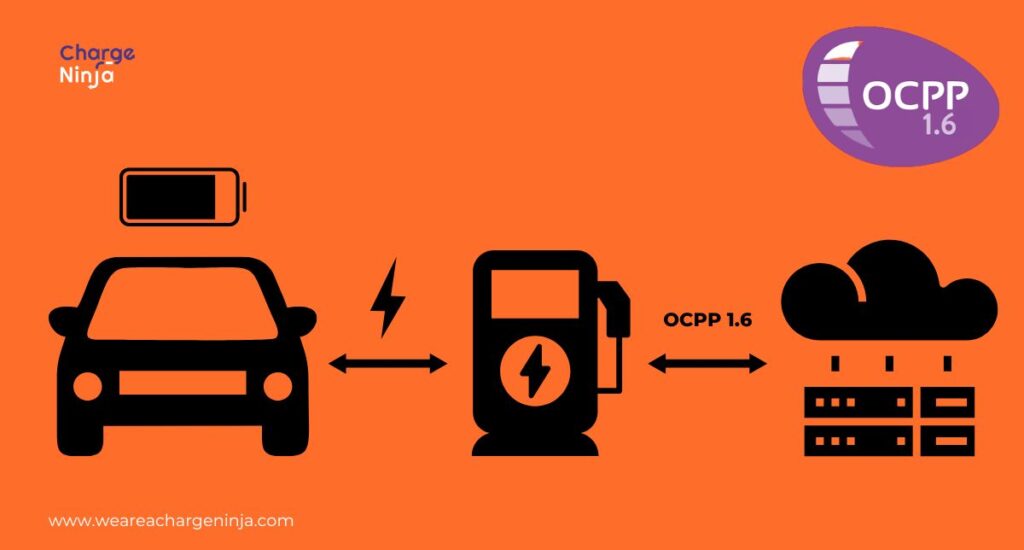As the EV market continues to grow, businesses are also becoming increasingly keen about finding the right EV charging infrastructure for their operations. Smart charging communication such as Open Charge Point Protocol (OCPP) 1.6 stands out due to its flexibility, interoperability, and cost-effectiveness. And this very well could be the optimal solution for businesses looking to manage EV chargers.
So what is Open Charge Point Protocol (OCPP) 1.6?
A bit of OCPP history
Founded in 2009 by the Open Charge Alliance, OCPP was created to standardise EV charging communication. This was achieved through collaboration, education, and rigorous testing. This protocol empowers smart charging for optimised energy management, strengthened security through encrypted communication, and real-time responsiveness via WebSockets, ensuring a more efficient charging experience.
Smart EV charging with OCPP 1.6
OCCP 1.6 protocol is an open communication standard that acts as a universal language, empowering EV charging stations to communicate seamlessly with charge point management systems. This protocol’s implementation ensures compatibility between devices that come from different manufacturers, fostering efficient interaction.
OCPP 1.6 compliance allows charging stations to integrate effortlessly into larger EV networks, promoting interoperability and building an interconnected EV charging infrastructure.
Core Features of OCPP 1.6
- Smart Charging – OCPP 1.6 enables smart charging by allowing central systems to manage charging power and consumption through load balancing and charge profiles. This allows for dynamic adjustments based on grid conditions and user needs, ensuring efficient energy usage.
- Remote Management – OCPP 1.6 allows Charge Point Operators to remotely monitor, diagnose, and receive firmware updates and customised reports on their EV charging infrastructure.
- Basic Functionality – It provides the necessary control for charging stations for an effective operation and seamless charging session management.
- Error Reporting – Offers basic remote troubleshooting which includes basic diagnostic features. It enables proactive maintenance for improved reliability.
- Enhanced Security – It actively secures systems with improved authentication and encryption measures, bolstering protection against cyber threats.
- Reservation System – OCPP 1.6 has a reservation system with pre-booking features. This provides EV drivers with the ability to secure charging spots in advance, ensuring availability and eliminating frustrating wait times.

Why Stick with OCPP 1.6?
OCPP 1.6 makes smart charging achievable, despite its inherent complexities. Even with the rise of OCPP 2.0.2 with more advanced features, OCPP 1.6 still remains prevalent in the EV charging landscape due to its cost-efficient, compatible, and easy-to-integrate solutions.
However, sticking to the basic implementation of its core profile leaves a significant potential untapped. Fully embracing OCPP 1.6 potential unlocks optimal functionality, meeting diverse market needs and improving overall user experience.
For businesses looking to optimise their EV charging operations, OCCP 1.6 gives you a competitive advantage with its flexible, robust features and broad compatibility for an enhanced charging experience for your customers. The adoption of OCCP 1.6 sets your operation up for long-term success in the EV landscape.
Talk to us and we will help you determine the best solutions for your EV business.
How does OCPP 1.6 support smart charging?
OCPP 1.6 supports smart charging by allowing central systems to manage charging power and consumption through load balancing and charge profiles.
What are the security features implemented in OCPP 1.6?
OCPP 1.6 incorporates robust security measures such as TLS encryption, secure firmware updates, and certificate-based authentication, and compliance with current cybersecurity standards.
What is the difference between OCPP 1.6 and OCCP 2.0.1?
OCCP 2.0.1 provides more advanced smart charging functionalities compared to OCPP 1.6, however, OCPP 1.6 is widely adopted due to its reliable basic functionality, making it the most preferred protocol in the EV landscape.
